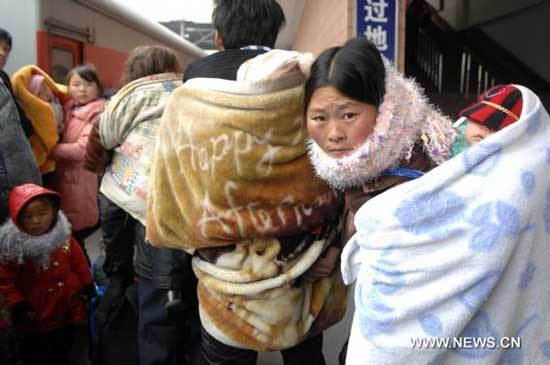People on journey home amidst winter freeze
China on Wednesday will begin its annual Spring Festival travel rush, with an expected some 230 million trips in the coming 40 days.
|
|
Airlines and trains have been added to cope with the passenger surge, which is 11.6 percent up year on year, according to the Ministry of Transport.
The airport in Harbin, capital of northeast China's Heilongjiang Province, announced Tuesday it would add another 252 flights for the travel peak period.
The capacity of airlines in the Inner Mongolia Autonomous Region will be raised 30 percent.
In southwest China's Chongqing Municipality, a major hometown to migrant workers, 12 flights with 5,100 seats will be added between Chongqing and Guangzhou, capital of south China's Guangdong Province.
Except for the temporary trains, more high-speed trains have been put into operation for the Spring Festival.
The high-speed train will be increased to 88 pairs this year, 55 more than last year's 33 pairs in Wuhan, capital of central China's Hubei Province, which largely eased the difficulties of buying tickets for passengers.
Snow and sleet has struck five provincial level regions, including Hunan, Guangxi, Chongqing, Guizhou and Yunnan since Monday, disrupting transportation networks.
The Ministry of Public Security Tuesday ordered police in the five hard-hit areas to go all out to keep traffic flowing and make sure no expressways were shut down due to slippery roads.
Police in the five localities were ordered to clean snow and ice on the roads and store emergency response materials, such as snow blowers, and maintain control of the flow of vehicles heading to the hardest-hit Guizhou province.
"Snow and ice will bring great difficulties to transportation," said Weng Mengyong, vice minister of the Ministry of Transport (MOT).
Five aspects of work, including anti-ice preparation, information release, monitoring network, emergency reaction and cooperation with public security bureaus, had been arranged ahead of the travel peak, Weng said.
In early 2008, freezing weather across southern China caused power cuts and transportation chaos, preventing many residents from going home for family reunions during China's lunar new year.
Other new services are also being supplied as the pressure of transportation is increasing this year.
The Wuhan Railway Administration started ticket delivery services for migrant workers this year and about 3 million tickets will be delivered.
In south China's Guangxi Zhuang Autonomous Region, the Nanjing Railway Administration opened micro-blogs on Sina.com and QQ.com to offer railway transportation information.
In the next 40 days, not only passengers, but also railway crews, will face great challenges.
"Patrolling is like a sauna to me," said railway police Zhao Hongye in Lanzhou, capital of northwest China's Gansu Province.
"It is too crowded. The 18 carriages are only 450 meters long, but it takes me at least two hours to go though," Zhao said.
"It is the homesickness which makes the huge migration," said Li Jiwei, a college student in Lanzhou, who had been counting the hours to get on his train home.
"It's only 10 hours left," he said. "I cannot wait to go home. The warm of home can offset all the difficulties on the journey," he said.
"There is no Spring Festival if you are not at home," said Zhou Changnong, a migrant worker, heading from Xining, capital of southwest China's Qinghai Province, to his home town in central China's Hunan Province.
 0
0 








Go to Forum >>0 Comments